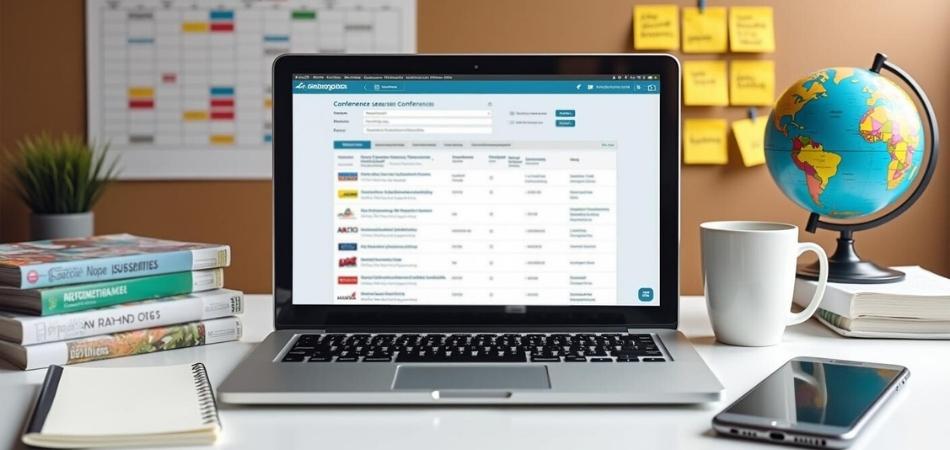Conferences are great for networking, professional growth, and keeping up with industry trends. Whether you want to advance your career or expand your knowledge, the right conference can make all the difference. But, how do you get a conference?
To get a conference, search online for industry-specific events, where you can find a variety of listings. Social media platforms can also be an excellent source of information about upcoming conferences, as many organizers share their events through these channels. Additionally, consulting your professional network can help you find relevant conferences.
Interested in learning more? Follow this article to find expert tips, resources, and strategies for identifying and registering for the most appropriate conference to enhance your career or academic journey.
How Do You Get a Conference?
The right conference can be the key to networking opportunities, professional growth, and new insight. Whether you’re a first-time attendee or a seasoned professional, knowing where to look is key. This step-by-step guide will simplify the process for you.

Step 1: Explore Online Platforms
Search online to discover a variety of upcoming international conferences in your field. Use specific keywords to narrow down options that match your interests. Look for detailed listings that provide information on dates, locations, and topics. This approach ensures you identify events that fit your professional goals.
Step 2: Use Social Media to Stay Updated on Events
Social media is a powerful tool for learning about conferences. Follow industry leaders, organizations, and relevant hashtags to keep track of event announcements. Engaging with posts can help you gather more details about the events. This method often uncovers opportunities you might miss elsewhere.
Step 3: Seek Recommendations from Your Professional Network
Reach out to colleagues, mentors, or peers to ask for conference suggestions. Professional networks are often aware of high-quality events in your industry. Attend meetings or discussions where upcoming conferences may be mentioned. Trusted recommendations are especially useful for finding conferences specific to your interests.
Step 4: Subscribe to Newsletters and Set Alerts
Sign up for newsletters from organizations related to your profession or industry. These often include updates on upcoming conferences and events. You can also set email alerts for specific topics to stay informed. This proactive approach ensures you never miss relevant opportunities.
Step 5: Research Reviews and Feedback for Insights
Before committing to a conference, take time to read reviews or feedback from previous attendees. Insights from blogs, forums, or social media can reveal the value of the event. Focus on feedback related to the quality of speakers, topics, and overall organization. This step helps you choose wisely.
Step 6: Register Early and Prepare Thoroughly
Once you’ve selected a conference, register early to secure your spot and enjoy potential discounts. Review the agenda, speakers, and topics to understand what to expect. Plan your travel and accommodations well in advance to ensure a smooth experience. Preparation enhances both learning and networking opportunities.
Is It Better to Attend Local or International Conferences?
Deciding between local and international conferences depends on your goals and available resources. Local conferences are convenient and cost-effective, offering networking opportunities with nearby professionals. They also provide valuable insights into regional trends and practices within your field, making them accessible and practical for many attendees.
International conferences, on the other hand, expose you to global perspectives and innovative ideas. These events allow you to meet experts and peers from diverse backgrounds. The experience often broadens your horizons, helping you find a good conference that aligns with your global aspirations.
Both options have their benefits, so consider your objectives and resources before choosing. Local events are ideal for building regional connections and staying informed about nearby trends. International ones are perfect for expanding your reach and understanding the global landscape of your industry.
Types of Conferences Attendees Can Search to Participate
Conferences provide excellent opportunities to learn, network, and grow professionally. Choosing the right type depends on your goals and field. Here are some popular conference types attendees can search for and participate in based on their interests.
Business Conference
Business conferences focus on professional growth and industry trends, attracting entrepreneurs and corporate leaders. They feature sessions on strategy, leadership, and innovation. Networking opportunities allow attendees to build connections with like-minded professionals. Such events often showcase tools and techniques for achieving business success and competitive advantage.
Healthcare Conference
Healthcare conferences bring together professionals to discuss advancements in medical research and patient care practices. These events focus on technologies, treatments, and evolving healthcare policies. Attendees benefit from expert panels, workshops, and networking opportunities. Such conferences often include discussions on improving global healthcare systems and addressing critical challenges.
International Education Conference
International education conferences highlight global learning initiatives and cross-cultural collaboration. These events attract educators, policymakers, and researchers dedicated to advancing international education systems. Participants engage in workshops and presentations to explore innovative teaching practices. They also provide a platform to build partnerships for future educational programs and projects.
Marketing Conference
Marketing conferences explore strategies for reaching audiences and building strong brand identities. They feature expert speakers discussing digital trends and consumer behavior. Workshops and panels focus on practical tools for improving marketing campaigns. Attendees gain actionable insights to enhance their advertising and branding efforts effectively.
Academic Conference
Academic conferences are ideal for scholars and researchers seeking to share knowledge and findings. These events encourage collaboration across academic disciplines and research fields. Research organizations and university websites are the best places to find academic conferences. Here participants gain insights into emerging trends and innovative ideas in their field.
Medical Conference
Medical conferences emphasize advancements in clinical practices, diagnostics, and treatments. These events gather medical practitioners, researchers, and healthcare leaders for impactful discussions. They often include presentations on groundbreaking discoveries and patient care techniques. Such conferences are essential for staying updated in the fast-evolving medical field.
How Do Industry Trends Influence Conference Selection?
Conference choices are influenced by industry trends that highlight relevant topics and emerging challenges. Attendees look for events that address new technologies and market shifts. This ensures they stay updated on critical developments within their fields. Conferences that align with these trends offer valuable insights for professional growth.
Organizers design conferences to reflect the most pressing issues and opportunities within their industries. By focusing on trends, they attract professionals seeking relevant content. Sessions often feature experts discussing innovative solutions or strategies tied to these trends. This makes the event more appealing and impactful for attendees.
Professionals often prioritize conferences that help them understand and adapt to current industry changes. These events provide tools and knowledge to deal with challenges effectively. Attendees can gain insights into best practices through case studies and expert panels. Networking opportunities further allow them to discuss trends with peers and leaders.
Choosing conferences aligned with industry trends ensures maximum relevance and value for participants. It allows professionals to gain practical insights applicable to their roles. Staying in tune with trends also helps them remain competitive and innovative. Such conferences become essential platforms for learning, collaboration, and personal development.
Tips for Utilizing Tools for Finding Niche Conferences
Discovering niche conferences can be challenging, but the right tools make the process easier and more efficient. These tools help you find events that align with your specific interests and professional goals. Here are practical tips for utilizing such tools effectively.
- Understand Your Niche Requirements: Identify your industry focus and goals before exploring tools. A clear direction helps you filter conferences that match your needs.
- Use Keyword-Based Search Tools: Leverage search tools by entering specific keywords related to your niche. This narrows down results to highly relevant events.
- Set Up Alerts for Event Updates: Enable alerts on conference tools to receive notifications about new events. Regular updates keep you informed about opportunities.
- Utilize Professional Platforms for Insights: Explore professional platforms to access curated lists of niche conferences. These platforms often highlight events based on your interests.
- Engage With Online Communities: Join forums or social groups where professionals share niche conference recommendations. These communities provide valuable, firsthand information about events.
- Compare Features Across Tools: Evaluate tools based on user reviews, accuracy, and customization. Comparing features helps you choose tools that meet your preferences.
- Monitor Organizer Websites Regularly: Visit organizer websites often to find upcoming niche conferences. Many list events that may not appear on broader platforms.
- Track and Analyze Past Events: Research past conferences using tools to gauge their relevance and success. This helps identify reliable options for future attendance.
FAQs How Do You Get a Conference
The right conference can have a profound impact on professional development and networking. To help you manage this process, we’ve compiled frequently asked questions and detailed answers. These FAQs will provide you with additional insights and actionable advice.
Why Is It Important to Attend Conferences Regularly?
Regular conference attendance keeps you updated on industry trends and innovations. It strengthens your professional network and provides insights into best practices. Attending consistently ensures you remain competitive and informed in your field.
How Can Small Businesses Benefit from Conferences?
Small businesses can gain exposure, build partnerships, and learn strategies to improve operations. Conferences often provide tools and resources specific to small enterprises. enterprises. Networking with industry experts helps identify growth opportunities and overcome challenges.
What Are Hybrid Conferences and How Do They Work?
Hybrid conferences combine in-person and virtual elements, offering flexibility to attendees. Participants can join online or on-site based on convenience. These events broaden access while maintaining the benefits of traditional conferences, such as networking and interactive sessions.
How Do You Identify Conferences That Offer Certification?
Look for conferences providing certification or continuing education credits in their program descriptions. Certifications add value to your professional profile. Verify the event’s credentials to ensure the certification holds industry recognition and credibility.
What Are the Benefits of Early Registration?
Early registration often provides discounts and guarantees a spot at popular events. It also allows time to plan travel and accommodation. Early access to materials or sessions may also be included as part of the package.
Bottom Line
Professional development, networking, and staying current with industry advancements are all enhanced by attending conferences. When it comes to the question, how do you get a conference? the process begins by searching online for industry-specific events, using social media for updates, and consulting professional networks for recommendations.
Knowing your objectives and utilizing tools like newsletters, alerts, and reviews can help you find the perfect match. Whether local or international, attending a conference aligned with your goals ensures you gain actionable insights and expand your connections. By staying proactive and informed, you can make the most of these opportunities to enhance your career or academic pursuits effectively.







